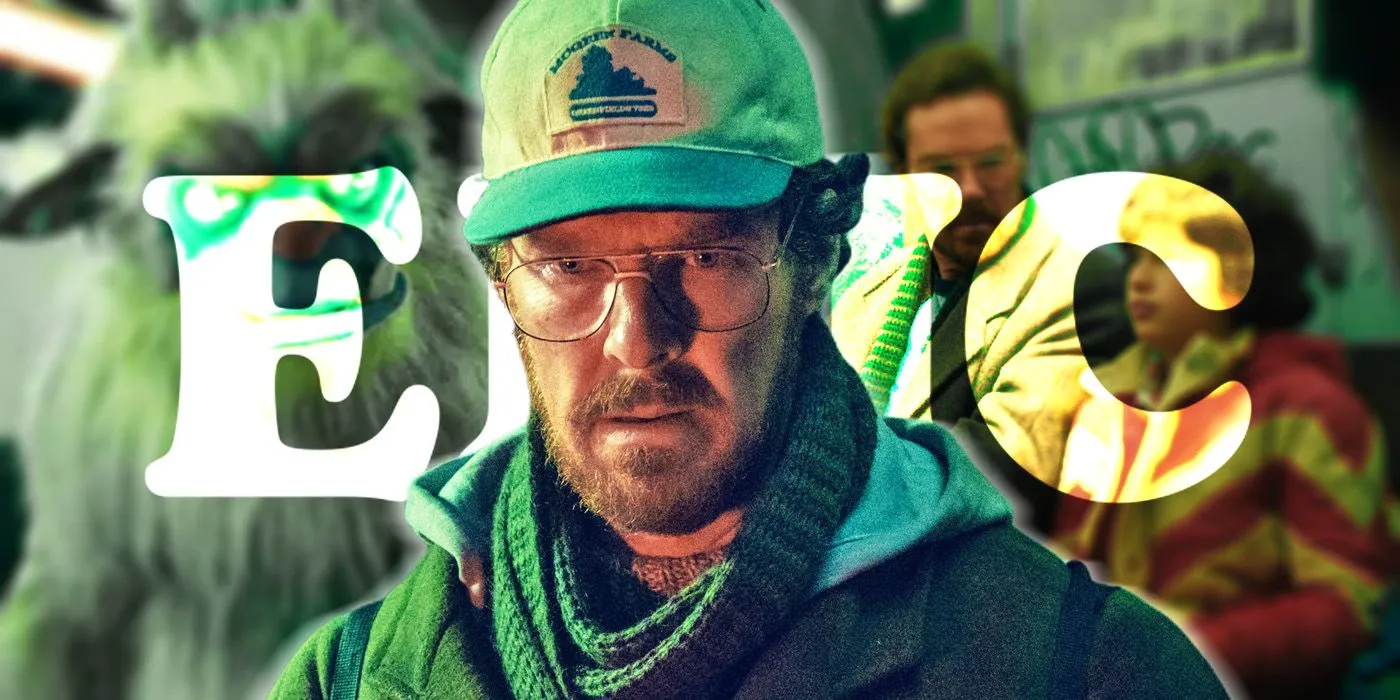It’s hard to understand why Netflix would invest in a show like Eric. While it’s clear that true crime is a popular genre for the platform, the fact that this series is fictional and filled with heavy gloom makes it difficult to see what the appeal could be.
If the show were based on a real story, there might be a reason to watch, but instead, I found myself questioning whether Eric was trying to portray a real-life tragedy. The story takes place in New York City during the early 1980s, far removed from the colorful and lively 1980s typically shown in pop culture.

Vincent, portrayed by Benedict Cumberbatch, is the creator and manipulator behind the long-running children’s TV series Good Day, Sunshine!. His arrogant and harsh demeanor extends to everyone around him, from colleagues to executives who hold the purse strings.
The negative energy even infects his home, where he lives with his chain-smoking wife, Cassie (Gaby Hoffmann), and their young son, Edgar (Ivan Morris Howe). One evening, after work, Vincent lashes out at Edgar, who enjoys making his puppet characters.
This results in a heated argument between Vincent and Cassie before they go to bed. The next morning, as the couple tries to reconcile in the stairwell of their apartment building, Edgar takes off to school on his own in the tough streets of New York. However, he never reaches his destination.
The Search for Edgar and the Unfolding Chaos
The next six episodes track Vincent and Cassie’s continued fights and eventual separation. Meanwhile, Vincent’s relationships with co-workers, including Lennie (Dan Fogler), fall apart, and his mental state deteriorates.
As he begins to speak to a large puppet monster named Eric, which Edgar created, Vincent embarks on a wild search for his son. He screams at Eric, abuses drugs, and even parties, much like a grieving parent might do in these extreme circumstances.
In the background, Detective Ledroit (McKinley Belcher III) is also searching for Edgar, as well as Marlon Rochelle, a teenager who went missing the previous year. There’s a clear racial divide between the two missing children – Edgar is white, while Marlon is Black.
Ledroit, a Black man, continues to search for Marlon despite others giving up on him. He’s also grappling with his struggles, including being closeted and caring for a partner who is dying of AIDS, a subplot that feels like it was forced into the show to add more distress.
While Eric attempts to comment on social issues such as systemic racism, police brutality, homelessness, 1980s-era homophobia, mental illness, and parenting, it ends up being a confusing jumble that fails to clearly address any of these themes.
The atmosphere is drenched in negativity, with a performance from Cumberbatch that feels suffocating. The introduction of the magical realism of the giant puppet Eric, however, doesn’t mesh with the serious tone of the rest of the series and almost feels out of place.
The Emotional Shift and Ending
The show is neither enjoyable to watch nor engaging, and given that it’s not based on a true story, the only reason to continue watching is to figure out what happened to Edgar. And when the moment comes, it’s disappointing.
Edgar’s disappearance becomes a media frenzy, with the entire city seemingly searching for him. A bloody shirt from the day he vanished and a teenager wearing his jacket only add to the mystery. Vincent becomes a suspect, as does a kind elderly man played by Clarke Peters.

The vice cops are called in, and they beat Marlon to death. To cover it up, sanitation workers, under the deputy mayor’s orders, dispose of his body in a landfill. Meanwhile, Edgar has been leaving drawings in the boiler room of their apartment. Vincent finally realizes that the drawings form a map.
Driven by drug-fueled delusions, he follows the map, which leads him to an underground community of homeless people. After doing crack, Vincent passes out but spots Edgar, who had followed a man named Yuusuf (Bamar Kane) into the underground shelter.
Yuusuf is kind to Edgar but believes the boy should return home. However, Vincent’s encounter with Edgar ends when police raid the underground community, and the boy vanishes once more. Upon waking from his bender, Vincent puts on the Eric puppet costume, and this is where the tone of the series abruptly shifts.
In full costume, Vincent crashes a rally for homelessness, takes the stage, and delivers an apology, both to Edgar and to the cause. He vows to be a better father and says, “Everyone deserves a home where they’re safe and not scared,” before removing the Eric mask.
At this point, Edgar, who is watching the broadcast in a diner, sneaks in to eat someone’s leftovers. As the music swells, the moment takes on a strangely sentimental feel, akin to a family comedy. “Edgar, buddy. If you’re watching this, I’ll race you home,” Vincent says.
Edgar runs off, and Vincent follows, both making their way through the streets of New York until they reunite in front of the apartment building. Cassie arrives, and the three share an emotional moment. The atmosphere shifts as it feels like a different series altogether.
The series ends with a postscript that reveals Vincent went to rehab, and all is well for the family. However, Lennie is outed for involvement in a gay prostitution ring, the homeless community continues to suffer, Marlon’s mother grieves her missing son, and Detective Ledroit loses his partner and his apartment due to homophobia from his late partner’s family.
In the end, Eric is a series that tries to address too many issues without doing justice to any of them. The emotional shift towards the end feels unearned and out of place. It’s an experience that leaves a bad taste, particularly as the show’s message about the struggles of homelessness and racial injustice comes across as tone-deaf.



